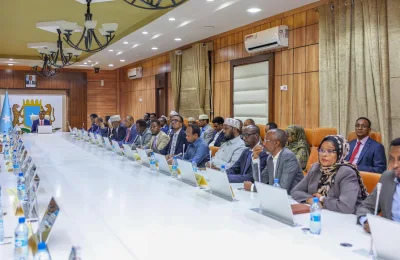Somalia is a maritime nation and has the longest coastline in continental Africa. With its strategic…
Somalia is a maritime nation and has the longest coastline in continental Africa. With its strategic maritime location, nestling at the tip of Africa, and having close proximity to Arabia and Asia, Somalia’s coast has always acted as a link between Africa and the rest of the world.

In the 19th century, way before Asia became the largest supplier of seafarers to the world’s merchant fleet, there was a large Somali seafaring community that was traversing the world’s oceans.
It is these seafarers who Major H. Rayne, the British representative to Somalia at the end of the 19th century is referring to when he notes “The Somali wanders afar. You will find him working as a deck hand, fireman, or steward, on all the great liners trading to the East. I know of a Somali tobacconist in Cardiff, a Somali mechanic in New York, and a Somali trader in Bombay, the latter of whom speaks French, English and Italian fluently”.
These seafarers who are fondly referred to as “Seaman” by the Somali community have settled and established roots in many of the places they have travelled to.

This open minded mobility, which is deeply rooted in Somalia’s rich nomadic tradition is what made Somali’s of yesteryear such exemplary seafarers.
With the first ever literary novel published in the Somali language, having the ocean as a setting, it comes as no surprise then that this close affinity with which Somali’s have with the ocean can be felt even through literature. Aqoondarro waa u nacab jacayl (Ignorance is the Enemy of Love) by Faarax Maxamed Jaamac, based on a real incident, tells the story of a couple brought together by fate as the ship which they are travelling upon runs into a storm.
Somali’s are renowned for their high business acumen and entrepreneurial spirit and trade reinforces their connection with the sea.
As my friend would say “put me anywhere on god’s earth and I will treble my worth”. As is the case with most Somali’s. Despite some of their shortcomings on the motherland, put them in any corner of the globe and sure enough, Somali-owned businesses will be sprouting within a short period of time.
This entrepreneurial spirit can be seen today with Somali’s doing a brisk business in places such as Nairobi, Istanbul, London, Minneapolis, Guangzhou and Sao Paulo, just to name a few.
Yet most of these entrepreneurs seem to be blind to the immense opportunities that lie in Somalia’s maritime sector. More than 95% of Somalia’s imports and exports pass through the sea.
The maritime sector should be a significant contributor to the nation’s economy. The comparative advantage afforded by Somalia’s strategic location is raising interest from far and beyond. With major port management companies signing contracts to develop Somalia’s ports, the potential in Somalia’s maritime sector is a no brainer.
Despite Somalia’s rich maritime heritage and partly due to the recent upheaval in the country, there is a generation that has grown up with a perception of the sea as only a lawless place, where resources are plundered and instead replaced with toxic waste.
This negative perception of the sea needs to be reversed by first of all tackling the real issues that exist, which can only be achieved by ensuring Somalia has the capacity to patrol its own waters.
However, coming back from a couple of decades in the wilderness, so to speak, what’s lacking in a major way is the intellectual base that is required for a functioning maritime sector, which can be overcome through the establishment of maritime academies.
Despite the prevalence of educational institutions in Somalia, especially in the big cities, education in the maritime sector is almost none existent.
Engaging the youth of the potential maritime careers that exist, both onshore and offshore will be essential in order for Somalia to leverage its strategic maritime position. Training facilities will be required for the youth to explore maritime career opportunities such as ship repair and marine equipment production, maritime law and arbitration, maritime regulatory authorities, ports and harbour management and pilotage, as well as offshore exploration.

However, none of this will be possible without a secure environment where maritime related industries can feel secure enough to flourish. Therefore, if the current trend of security improvements can be used as a predictor for the future, then the prognosis looks good.
Rather than being a place of doom and gloom, where the youth perish while in search of a better life abroad, the coast has the potential to be a place of opportunity and hope.
#AtSeaForAll #DayOfTheSeafarer






